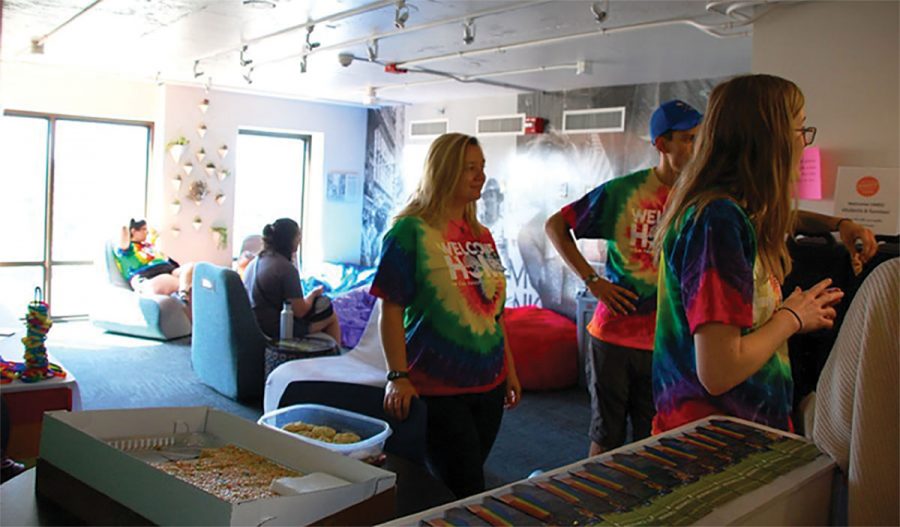The importance of safe spaces
As LGBTQ kids move into the Rainbow Floor, the question arises if we even need safe spaces
Photo by Liam Beran
Students enjoy an afternoon in the Rainbow Floor lounge, a floor specifically for LGBTQ students and allies to find an inclusive place to live
When I was moving in a day early as a part of the Rainbow Community, my mother wondered out loud whether I felt “segregated” from straight people as a result of my early move in. I hadn’t really thought about that before, and yet the thought itched at the back of my mind.
Though I wasn’t moving into the Rainbow Floor, a floor specifically for LGBTQ students and allies to find an inclusive place to live, I still wondered whether my participation in a so called “safe space” would mean that I would be isolated from my fellow peers.
With the advent of the Rainbow Floor and similar inclusive communities, many have voiced concern that the concept of a safe space acts merely as a shield from differing opinions and stifles free speech of others. Critics of safe spaces are varied and from both sides of the political aisle, though the most prominent detractors are typically social conservatives.
Safe spaces, despite the recent hubbub, are nothing new. As early as the 1940s, queer bars and women’s rights organizations acted as meeting places for like-minded people to share experiences and find solace, according to The Washington Post. Yet the recent proliferation of safe spaces into public campuses means that these safe spaces, unlike queer bars and feminist organizations, which maintained a relatively low profile, are often cast directly into the public eye.
My experience with safe spaces is also important in this discussion — I’m a frequent visitor to the Rainbow Floor. As a queer student, I can’t lie that it feels nice to have people who understand and have gone through the same struggles that so many LGBTQ people face. Yet there still is a nagging voice in the back of my head that says that I’m being coddled or babied.
It’s vitally important to recognize the role safe spaces had and continue to have in protecting marginalized communities — queer bars were often the only haven for queer people to interact with members of their community. These days, however, with 61% of Americans supporting gay marriage and only 31% opposing it according to the Pew Research Center, I often find myself wondering how vital the existence of a safe space really is to my wellbeing.
It’s also important to note that my experiences as a cisgender, masculine presenting white male allows me more safety when compared to my transgender, feminine, and POC friends — the HRC reported in 2018 that transgender hate crimes were on the rise, and transgender people of color were found especially vulnerable.
I believe that safe spaces are necessary in 2019, yet I find myself questioning what is “too far”.
While straight and cisgender white people may find the concept of safe spaces superfluous, it’s worth noting that the notion of speech that’s considered offensive to privileged people is different than the offensive speech often leveraged at marginalized communities.
White, heterosexual cisgender people will never be told that they don’t deserve to exist. They will never be told that their love is wrong, and they will never be told that the gender they identify with is an affront to a higher power.
I say this not to belabor the fact that cisgender white heterosexuals have privilege, but to acknowledge the idea that framing speech that questions a person’s right to exist as “civil debate” means that marginalized communities will be forced to debate their right to be a person, all while bystanders posit that both sides exist on equal moral ground.
When voices like the ever-popular Ben Shapiro, or comedian Tim Allen or even former president Barack Obama speak out against safe spaces, they have what I assume are the best intentions. Keep students exposed to differing viewpoints, keep students alert that not everyone agrees with them. And yet the predominantly straight male backlash against safe spaces isn’t helping anything.
By portraying marginalized groups as sheepish, chastened people, unable to stand against any form of oppression, these men discount the abuse and questioning marginalized groups withstand daily.
When someone says that LGBTQ people are “too extra,” or that “they’re fine as long as they don’t act gay,” that doesn’t phase me. What does phase me is when marginalized people are forced to engage in discourse with those who believe both that LGBTQ people are lesser, and that they shouldn’t exist at all. It’s immoral to believe that such discourse is valid or warranted, and to dismiss safe spaces as a concept is to bring validity to that discourse.
Beran can be reached at [email protected]











